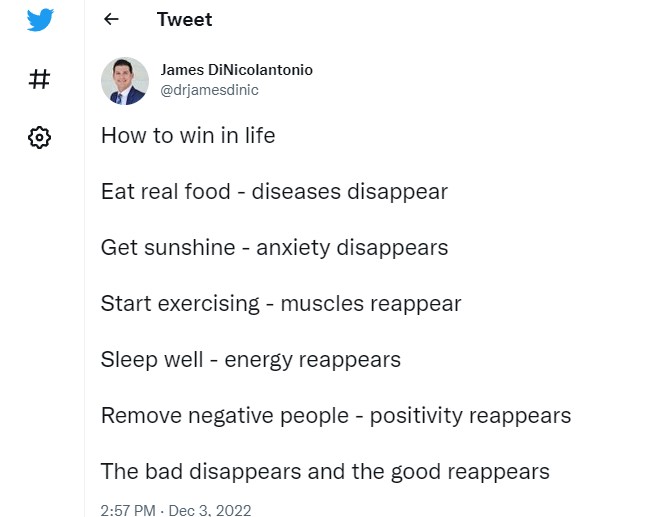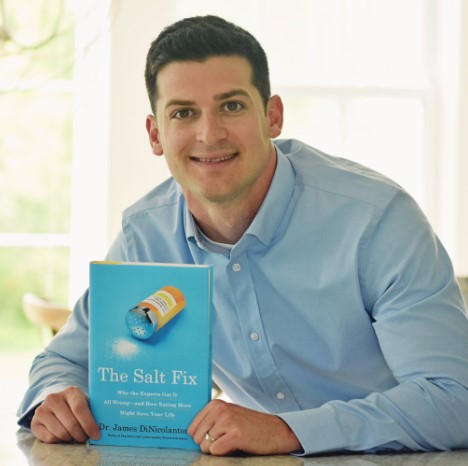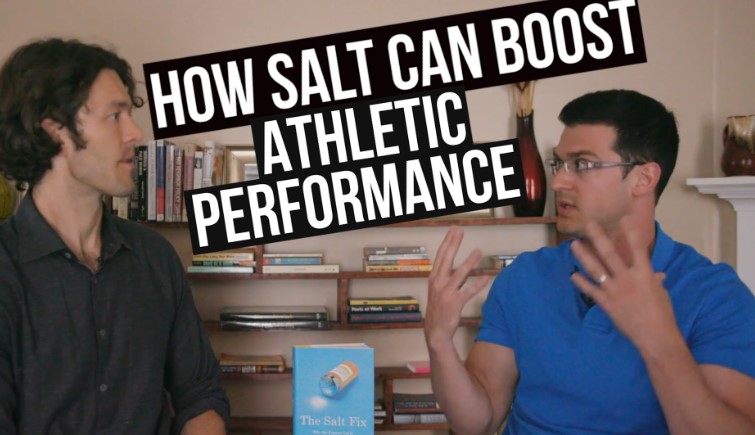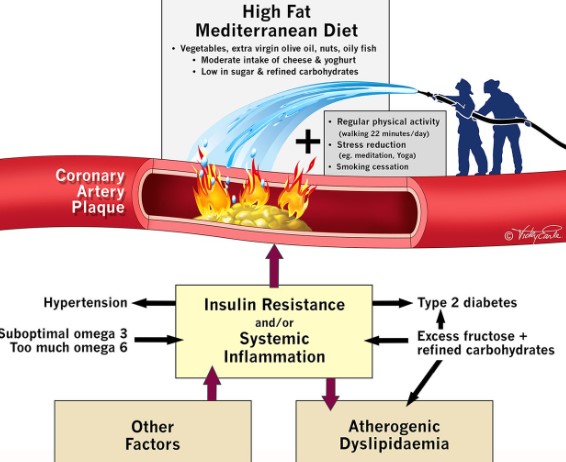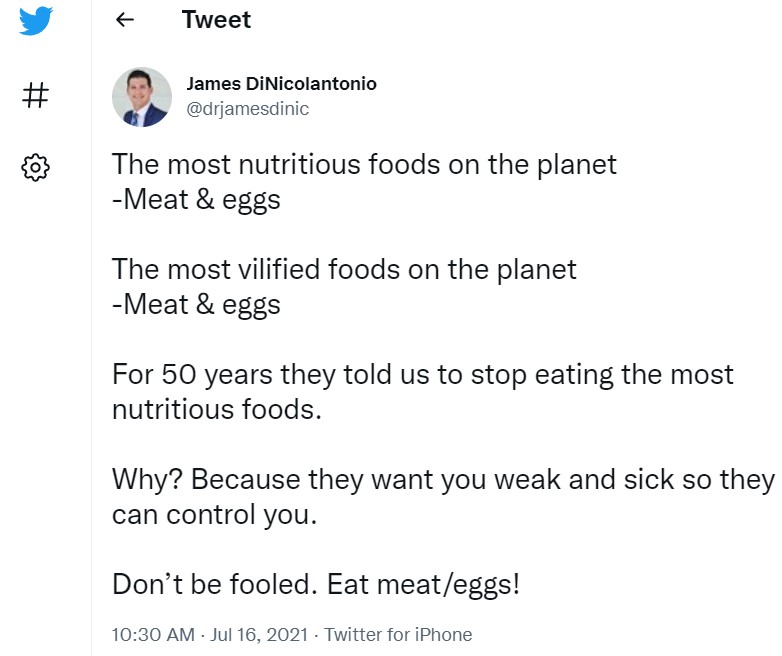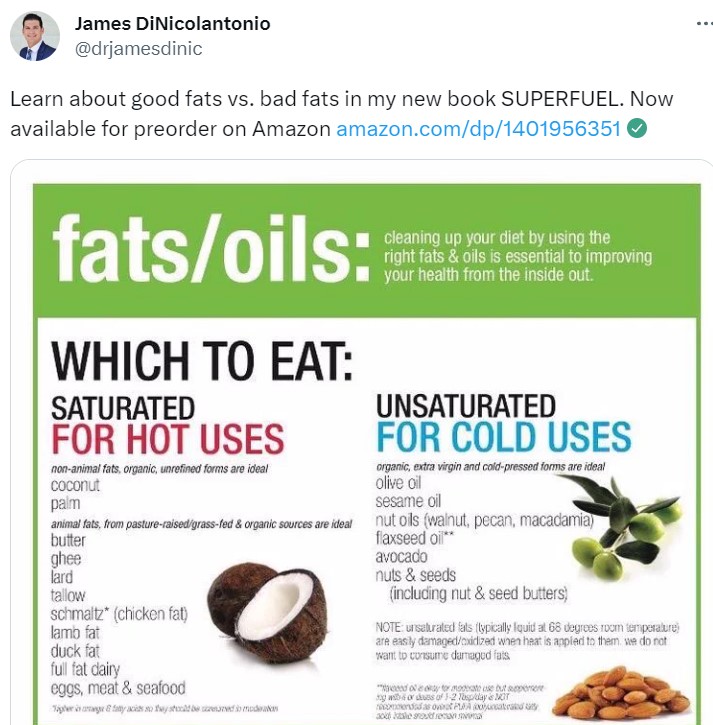Dr James DiNicolantonio Age, Wife, Family, Biography & More
| Bio/Wiki | |
|---|---|
| Full Name | James J. DiNicolantonio [1]Amazon |
| Profession(s) | Doctor |
| Physical Stats & More | |
| Eye Colour | Black |
| Hair Colour | Black |
| Career | |
| Positions held | • Director of Scientific Affairs at AIDP, Inc. , United States • Associate Editor Nutrition at Elsevier, a Dutch academic publishing company • Associate Editor at BMJ Open Heart, a cardiology journal |
| Notable Publications | • The Salt Fix: Why the Experts Got It All Wrong--and How Eating More Might Save Your Life (2017)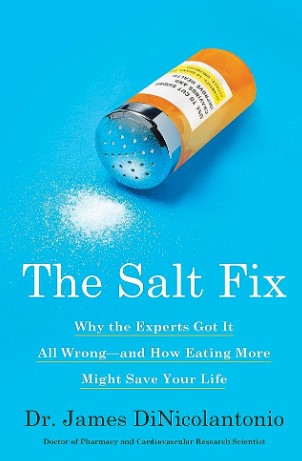 • Superfuel: Ketogenic Keys to Unlock the Secrets of Good Fats, Bad Fats, and Great Health (with Joseph Mercola, 2018) 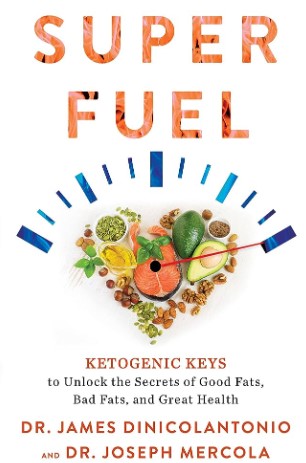 • The Longevity Solution: Rediscovering Centuries-Old Secrets to a Healthy, Long Life (with Jason Fung, 2019) 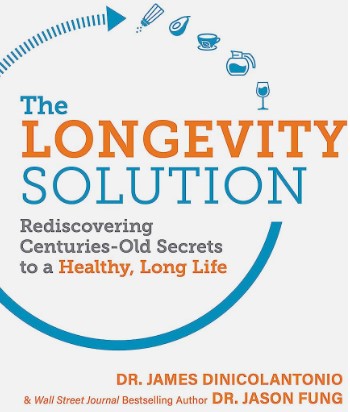 |
| Personal Life | |
| Date of Birth | 2 July 1987 (Thursday) |
| Age (as of 2022) | 36 Years |
| Birthplace | Rochester, New York, United States |
| Zodiac sign | Cancer |
| Nationality | American |
| Hometown | Rochester, New York, United States |
| College/University | University at Buffalo |
| Educational Qualification | Doctor of Pharmacy at University at Buffalo [2]James DiNicolantonio's LinkedIn Account |
| Food Habit | Non-vegetarian [3]Daily Dose |
| Hobbies | Travelling, Hiking, and Exercising |
| Controversies [4]Ashtead Hospital | Controversial Claims In 2017, in his book "The Salt Fix," Dr James DiNicolantonio presented a controversial idea that we should increase our salt intake instead of reducing it. He believes that consuming more salt might lead to consuming less sugar, aiding weight loss, and could also help those with diabetes. However, his views faced criticism from health organizations. He argued that many people might not need to follow strict low-salt diets and that having more salt might be healthier for most individuals. He suggested that excessive sugar consumption is linked to health problems like high blood pressure, heart disease, and kidney issues, so he encouraged embracing our desire for salt. Dr DiNicolantonio also challenged the belief that reducing salt lowers blood pressure significantly, stating that normal blood pressure individuals were not much affected by salt's impact on blood pressure, and even in those with high blood pressure about 55% did not respond to the effects of salt. Diet Controversies In 2017, soon after the release of his book, 'The Salt Fix,' Health organizations in the UK and other places have criticized DiNicolantonio's advice as incorrect and harmful. Louis Levy from Public Health England stated that promoting a high-salt diet endangers health and contradicts global evidence linking salt-rich diets to high blood pressure, a risk for heart disease. Graham Macgregor from Consensus Action on Salt and Health (CASH) disagreed with these claims and highlighted that when the UK lowered salt in food and advised less salt intake, it significantly reduced heart-related deaths. |
| Relationships & More | |
| Marital Status | Married |
| Marriage Date | 22 October 2010 |
| Family | |
| Wife/Spouse | Megan DiNicolantonio |
| Children | Son- Alex J. DiNicolantonio Daughter- Emmalyn DiNicolantonio  |
| Parents | Names Not Known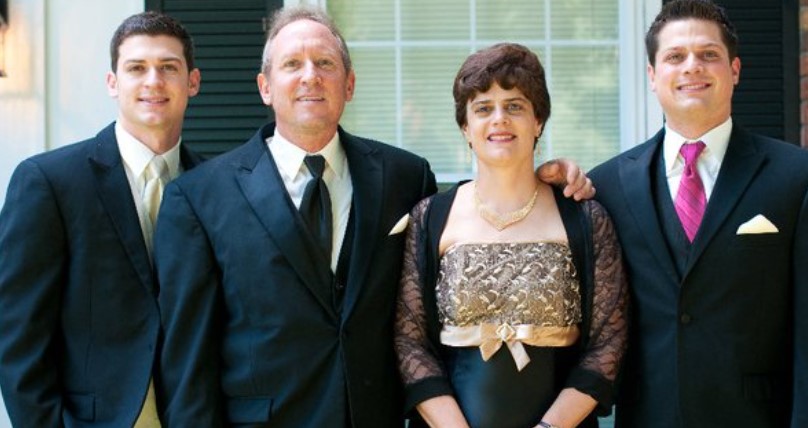 |
| Siblings | Brother- Joseph DiNicolantonio |
| Favourites | |
| Milk | Malk, Forager, and Elmhurst |
| Food | Wild salmon, Shellfish, Wild crab, Wild lobster |
Some Lesser Known Facts About James DiNicolantonio
- James J. DiNicolantonio is an American cardiovascular research scientist and a pharmacist at Saint Luke’s Mid-America Heart Institute in Kansas City, Missouri. He is well-known worldwide for his expertise in health and nutrition. He has made significant contributions to health policies and even testified before the Canadian Senate about the dangers of added sugars. James works as the Associate Editor for the British Medical Journal’s (BMJ) Open Heart, a journal published in collaboration with the British Cardiovascular Society. He has written or co-written around 250 publications in medical literature till 2023. Additionally, James is a member of the Editorial Advisory Board for several other medical journals including Progress in Cardiovascular Diseases and the International Journal of Clinical Pharmacology & Toxicology (IJCPT).
- Since July 2013, James J. DiNicolantonio has been serving Saint Luke’s Mid-America Heart Institute as its Cardiovascular Research Scientist. In February 2018, he began working as Associate Editor of Nutrition at Elsevier. He served in the position till January 2019. He then worked as a Senior Clinical Staff at WFM, Ithaca, New York Area, from January 2010 to April 2020. In April 2020, he started working as Director of Scientific Affairs at AIDP, Inc. and served in the position till July 2022. In July 2022, he joined BMJ Open Heart.
- James J. DiNicolantonio is known for his belief that salt has been unfairly criticized by the medical community and that consuming more of it can save lives. He also supports the oxidized linoleic acid hypothesis of coronary heart disease, although this view contradicts evidence-based medicine. In addition to suggesting people should eat more salt, DiNicolantonio supports low-carb and ketogenic diets. In 2018, he co-wrote a book called Superfuel with alternative medicine expert Joseph Mercola under Hay House publications.
- DiNicolantonio mentions on all of his social media accounts and website that he practices “Evidence-Based Nutrition.” Reportedly, on social media, he spreads fear and advises people to stay away from all seed and vegetable oils and claims that these oils contain linoleic acid that causes cancer, heart disease, and other chronic illnesses. However, these claims lack solid evidence. [5]James’s Twitter Posts Some nutritional websites do not support these claims. [6]Consumer Reports
- On one of his social media accounts, DiNicolantonio claims that consuming “real food” can make diseases go away.
- In 2017, in his book, The Salt Fix, DiNicolantonio, like Gary Taubes and others who follow a low-carb diet, claims that sugar is the main cause of many chronic illnesses. In his book, he advised people to increase their salt intake and reduce sugar consumption. However, his views on salt contradict the advice given by mainstream medical experts. Organizations like the American Heart Association warn against excessive salt intake because it can lead to high blood pressure, which increases the risk of heart problems like heart attacks, strokes, and heart failure. [7]Heart Evidence-based health authorities recommend limiting daily salt intake to about a teaspoon (6g). [8]NHS According to James J. DiNicolantonio,
Not only have we gotten it wrong, we’ve gotten it exactly backwards: eating more salt can help protect you from a host of ailments, including internal starvation, insulin resistance, diabetes, and even heart disease. (The real culprit? Another white crystal—sugar.)”
- James DiNicolantonio has questioned the common belief in eating less salt since he was in high school. However, while growing up, he found that increasing his salt intake helped him perform better in wrestling and running. He followed his family’s tradition by studying at the UB School of Pharmacy and Pharmaceutical Sciences, and as he worked in the organisation, his doubts about the low-salt idea grew stronger.
- In his writings, DiNicolantonio made some valid points about the importance of sodium as a necessary nutrient for the body, and he warned against the health risks of not consuming enough salt. [9]Healthline However, he took his stance on salt consumption to an extreme and denied any connection between salt intake and high blood pressure. Instead, he strongly blamed sugar for health issues. Medical experts criticized his advice to increase salt consumption, considering it potentially dangerous. His book, “The Salt Fix,” has faced scrutiny from health authorities like Public Health England (PHE). DiNicolantonio suggested through his book that people should have 7.5g to 15g of salt daily, which he considered a “normal” amount. [10]The Guardian However, Louis Levy, in charge of nutrition science at PHE, claimed in one of the media interviews that the main cause of ill health was poor diet. Levy said,
Diet is now the leading cause of ill health. By advocating a high-salt diet this book is putting the health of many at risk and it undermines internationally-recognised evidence that shows a diet high in salt is linked to high blood pressure, a known risk for heart disease.”
- In his book ‘The Salt Fix,’ James DiNicolantonio made a strange claim that early humans in the Paleolithic era had a diet high in salt. However, previous studies revealed that the opposite is true as their diet had very little salt. Later, his book received support from various low-carb enthusiasts like Marika Sboros and the Weston A. Price Foundation. [11]FoodMed [12]Weston A. Price
- James DiNicolantonio disagrees with the majority of scientists on the topic of cholesterol. According to him, the risk of cardiovascular disease is not increased by high blood cholesterol levels. He advocates a diet rich in saturated fat and holds sugar and carbs responsible for obesity and high cholesterol. DiNicolantonio has been charged with manipulating scientific data regarding saturated fat and its link to cardiovascular disease. Tom Sanders, Emeritus Professor of Nutrition and Dietetics, criticised his 2014 editorial for the publication Open Heart. [13]Science Media Centre Tom wrote,
This article rubbishes the relationship with saturated fat and CVD, misrepresents the scientific evidence and then goes on to put the blame on sugar. It is beyond reasonable doubt that elevated LDL (low density lipoprotein) cholesterol is a major determinant of risk factor for cardiovascular disease. The saturated fatty acids palmitic, myristic and lauric acids raise LDL cholesterol in increasing order in meta-analysis human experimental studies.”
- Professor of Nutritional Metabolism, Bruce Gryphon, explained the relationship between saturated fat and total cholesterol in one of his writings. He wrote, [14]The Telegraph
To suggest that the theory relating saturated fat to increased total cholesterol is flawed, is nonsense, and contradicts 50 years of evidence-based medicine.”
- James DiNicolantonio advocates the “oxidised linoleic acid hypothesis” as an alternative to the well-established low-density lipoprotein (LDL) oxidation theory of coronary heart disease (CHD). In 2018, he discussed this theory in a paper. DiNicolantonio claimed that coronary heart disease and a number of other disorders were brought on by linoleic acid, an important omega-6 polyunsaturated fatty acid (PUFA) found in vegetable oils and other meals. His theory stated that “dietary linoleic acid, especially when consumed from refined omega-6 vegetable oils, gets incorporated into all blood lipoproteins (such as LDL, VLDL, and HDL), increasing the susceptibility of all lipoproteins to oxidise and consequently increasing cardiovascular risk.” As of 2023, reportedly, there is no proof from evidence-based medicine to back up his claim, but there is a tonne of evidence to the contrary. For instance, in 2023, a source titled ‘Systematic review and dose-response meta-analysis of prospective cohort studies’ [15]Taylor and Francis has findings – Higher tissue levels of LA were associated with a reduced risk of prostate cancer.
- Unlike what DiNicolantonio claims, linoleic acid, which is a necessary type of polyunsaturated fatty acid found in many nuts, seeds, and vegetable oils, actually reduces the risk of coronary heart disease. [16]Harvard Linoleic acid is the main type of polyunsaturated fatty acid in various nuts, making up 40-60% of their total fatty acid composition, including Brazil nuts, pecans, peanuts, and walnuts. [17]Genes and Nutrition Studies have shown that consuming higher amounts of these nuts can lower the risk of all-cause mortality, cancer, coronary heart disease mortality, inflammation, and total coronary heart disease. [18]BMC Medicine This evidence contradicts DiNicolantonio’s hypothesis.
- In June 2023, he released his book ‘The Blood Sugar Fix.’ According to James DiNicolantonio, ‘The Blood Sugar Fix’ is a guidebook for obtaining ideal levels of insulin sensitivity, blood sugar control, and metabolic health.
Discussing my new book The Blood Sugar Fix https://t.co/9hDXQlXOgU pic.twitter.com/jFasGpZ3MX
— James DiNicolantonio (@drjamesdinic) June 1, 2023
- In 2018, James DiNicolantonio explained in one of his Twitter posts that he had no issues with individuals consuming nuts or cold-pressed nut oils that are high in linoleic acids like walnut oil, as long as these were consumed cold and not heated because this prevents them from being oxidised. [19]James DiNicolantonio’s Twitter Post According to some medical experts, if DiNicolantonio’s theory were accurate, consumption of vegetable or seed oils high in linoleic acid would be expected to considerably raise LDL-c levels, however, the contrary is true. For instance, it had been demonstrated that rice bran oil, which contains around 30% linoleic acid, substantially reduces serum TC, LDL-c, and TG levels. [20]Taylor and Francis Online It had also been demonstrated that sunflower and canola oils drastically cut LDL-c, [21]National Library of Medicine and about 65% of sunflower oil contains linoleic acid. Reportedly, in his research papers, DiNicolantonio asserts, without providing any supporting data that linoleic acid increases LDL-c.
- In one of his research papers, DiNicolantonio states that “Having too much linoleic acid in your diet makes blood vessel lining more active than having too much-saturated fat.” However, he does not provide any solid proof for this idea, apart from an outdated study on rats. He also claims that “Linoleic acid causes inflammation in blood vessels,” but he doesn’t give any clinical trial results to support this idea. [22]Open Heart James DiNicolantonio claims that there is no trustworthy information suggesting that adding linoleic acid to your diet increases levels of markers for inflammation. In fact, there’s evidence showing that linoleic acid actually helps reduce inflammation like how having more of it in your diet can lower the risk of rheumatoid arthritis. [23]University of Birmingham
- According to some renowned medical experts, DiNicolantonio’s extreme statement that “lots of signs point to the idea that linoleic acid, a type of omega-6 fat, causes problems like oxidative stress, bad LDL cholesterol, ongoing mild inflammation, and heart disease” does not have strong proof from science. [24]BMJ Open Heart Many of the sources he uses in his paper are old studies conducted on rats. Reportedly, many of his papers are often shared by people from the low-carb group on social media who have unconventional ideas.
- Nutritional scientist Nick Hiebert stated in one of his writings that the oxidised linoleic acid concept put forth by DiNicolantonio contains a fatal fault. [25]My Nutrition Scientist Reportedly, DiNicolantonio never addressed the connection between a high-salt diet and cancer. High salt intake raises the risk of colorectal, esophageal, and gastric cancer. [26]Frontiers
- According to some medical researchers, DiNicolantonio shares strange conspiracy ideas on his Instagram and Twitter accounts. DiNicolantonio suggests on social media that large pharmaceutical companies and the medical field deceive people and attempt to manipulate them.
They lied about tobacco
They lied about sugar
They lied about cholesterol
They lied about asbestos
They lied about mercury
They lied about Vioxx
They lied about fluoride
They lied about aspartame
They lied about glyphosate —James DiNicolantonio
- On one of his social media accounts, DiNicolantonio encourages using coconut oil and palm oil but advises against seed oils. However, other renowned scientists deny his claim and state that coconut oil can raise bad cholesterol (LDL-C), which raises the risk of heart problems. Reportedly, no scientific studies have proven that it makes your lipid profile better.
References/Sources:



